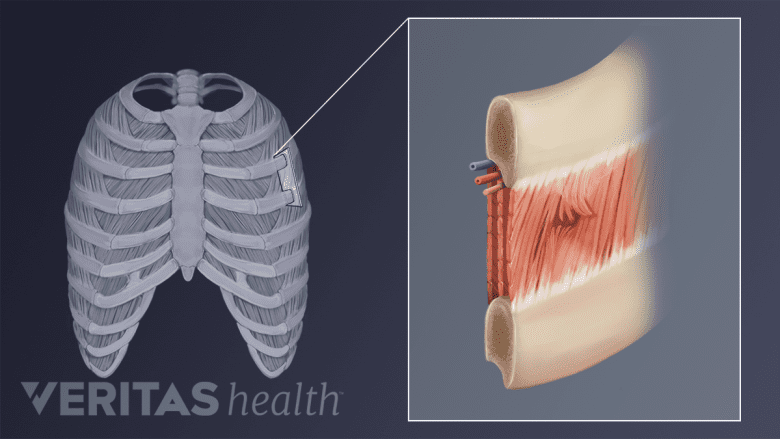Having back pain and trouble breathing can be particularly concerning, especially if you’re unsure about the cause. Here are some potential reasons why back pain and shortness of breath may occur together, as well as when to see a doctor.
Intercostal muscle strain
The intercostal muscles run between adjacent ribs and play an important role in expanding and contracting the rib cage when breathing. If one or more of these muscles are strained along the back, the symptoms can range from a mild tenderness or stiffness to intense, sharp back pain. Breathing may also become more difficult as the pain can worsen while the rib cage expands and contracts.
See Intercostal Muscle Strain Symptoms and Diagnosis
An intercostal muscle can be strained in various ways, such as:
- Overuse/overexertion. Doing an excessive amount of an activity that uses the intercostal muscles, such as rowing, can cause a muscle to overstretch and develop small tears. A sudden or awkward movement can also strain a muscle.
- Direct trauma. A collision or fall that directly impacts the ribs and connecting muscles could injure one or more of the intercostal muscles.
See Causes of Intercostal Muscle Strain
An intercostal muscle strain typically starts to feel better within a few days and fully heals within 6 to 8 weeks. To help manage the initial pain, which may be severe, some people find relief from ice, heat packs, or over-the-counter pain medications. It is also advised to modify or reduce activities for a few days to protect the strained muscles from further injury. If the pain is severe, prescription medication may be required after evaluation by a physician.
See Treating Intercostal Muscle Strain
Severe kyphosis
A healthy thoracic spine (upper back) is slightly curved forward, which is called a kyphotic curve or kyphosis. However, if the thoracic spine is curved at least 50 degrees, it is considered hyperkyphosis, also commonly referred to as kyphosis.
If a patient is still growing, kyphosis is commonly treated with a brace in an effort to prevent it from progressing to the point of causing troubles with breathing, walking, and other basic functions. Special exercises to improve posture may also be advised to help prevent kyphosis from worsening. If kyphosis has progressed to the point of causing breathing troubles, surgery may be needed.
See Kyphosis Causes and Treatment
Other potential causes
Some other causes of back pain with breathing troubles include:
- Rib displacement or fracture. When a rib becomes fractured or displaced, the pain can potentially become quite sharp or intense, especially when breathing or taking deep breaths. Sometimes a rib displacement or fracture can be accompanied by an intercostal muscle strain, which can also contribute to pain while breathing.
- Severe scoliosis. The abnormal sideways twisting and rotation of the spine, called scoliosis, can in rare cases become severe enough to affect breathing. Sometimes both scoliosis and kyphosis are present together.
- Allergic reaction. Some people may be at risk for developing an allergic reaction to some medications for back pain, such as muscle relaxants. Several troubling signs and symptoms could indicate an allergic reaction to back pain medication, such as difficulty breathing, chest tightness, swelling in the throat (or arms or legs), and/or hives.
Other potential causes of back pain and breathing problems that can be quite serious include infection and/or blood clots.
When to see a doctor
Any unexplained shortness of breath or breathing problems need to be evaluated by a medical professional. Additionally, seek medical attention if back pain does not go away on its own within a couple weeks or if other troubling signs are present, such as pain that radiates to the chest, or any tingling, numbness, or weakness that persists.







